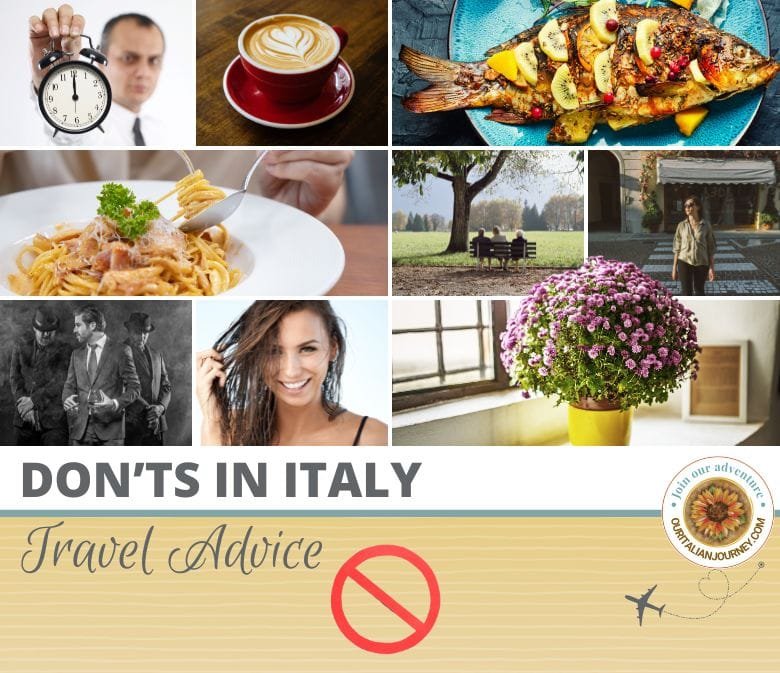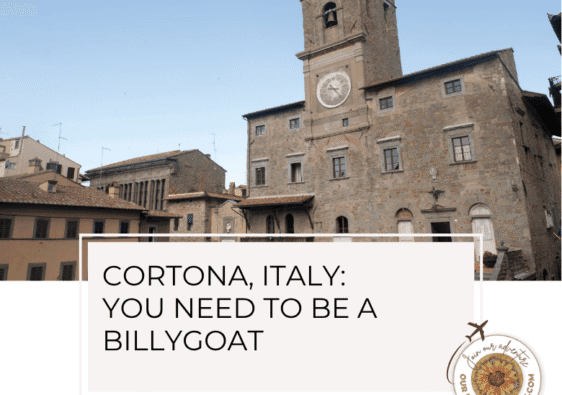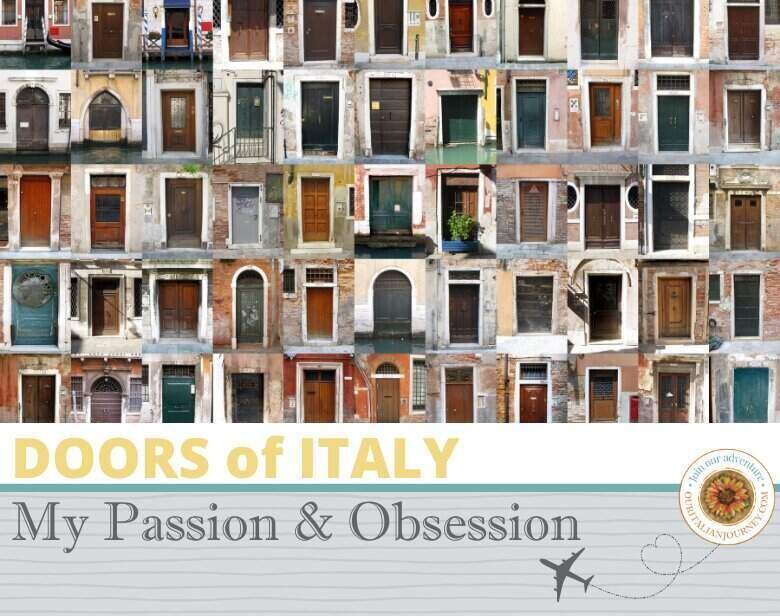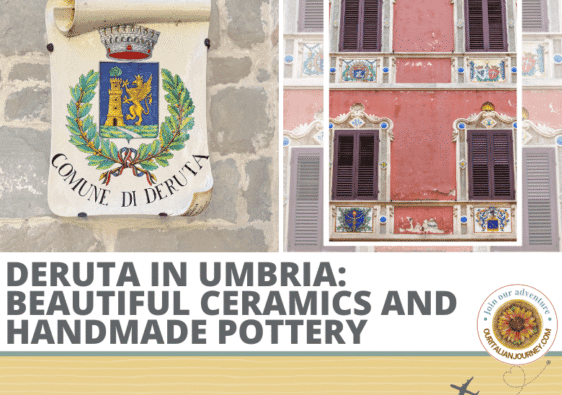Don’ts in Italy – Essential Tips for a Smooth Journey
Italy’s stunning landscapes, rich history, and culinary delights enchant us. Whether it’s your first time visiting or you’ve been before, the sheer beauty of this country often leaves travelers in awe. However, like any destination, Italy has unique, quirky customs and etiquette that can be easily overlooked if you’re unprepared. There are tons of superstitions, too!
This post contains affiliate links that help keep this website running. By purchasing through our links, we make a small commission at no extra charge to you. Thank you for your support!
The Unspoken Rules
While it’s tempting just to relax and go with the flow when you’re surrounded by such beauty, there are a few things you’ll want to avoid to make your trip even more enjoyable. Italian culture is full of unspoken rules, and knowing what not to do can save you from awkward situations and cultural missteps. Understanding the don’ts in Italy will help you navigate these cultural nuances.
What You Might Want to Consider
From navigating local customs to dining etiquette and transportation tips, understanding these “don’ts” will help you blend in like a local and make the most of your Italian adventure. Let’s dive into the key travel tips for what not to do in Italy—so you can enjoy all the Dolce Vita without the unexpected detours! So here is my researched list of don’ts in Italy, in no particular order:
- Don’t use “ciao” when first meeting someone. When you enter a store, start with “Buongiorno” (good morning) or “Buona Séra” (good afternoon/evening). Italians love it when you at least attempt to speak some Italian with them, even if it is apparent that you only know the basics.
- Try not to fall into tourist traps and only visit the “main attractions” in a town or city. There are many hidden gems in every Italian town. Seek them out.
- Don’t tip like in the States. It’s just not done here. Employees have a contract and are paid well. They don’t rely on tips to supplement their incomes, as they do in the States.
- By all means, don’t sit and have a picnic on monuments, historic steps, and fountains, or even inside museums. And above all, don’t forget to take your trash with you if you do.
- Ordering a cappuccino after noon is a sign you are a tourist. There is a reason Italians don’t order it after this time, and it has to do with milk restricting digestion – one of the key don’ts in Italy.
- Putting cheese on fish. It’s just not done. Italians believe that cheese takes away the flavor.
- Entering a home with an open umbrella or opening it once you’re inside. Italians are a very superstitious bunch.
- Putting bread upside down on the table. It’s again a superstition.

Now for the next set of Don’ts in Italy…
- Don’t forget to look both ways when crossing the street. It’s well known that drivers in Italy don’t always stop and wait for pedestrians to cross the street if they’re waiting at the crosswalk.
- Try to learn some Italian basics. Similar to greeting people, Italians love it when you at least attempt to speak some Italian with them, even if it is obvious that you only know the basics.
- Don’t talk about the Mafia. These are sensitive don’ts in Italy.
- Best not to bother being early to an appointment. Italians are often late.
- Don’t give an even number of flowers or chrysanthemums, they are associated with death.
- Italians eat dinner late – very late. Don’t expect to get a reservation before 7:00 PM.
- Discussing money matters is considered intrusive and impolite. Asking questions about personal finances should be avoided.
- Approach topics like religion and politics with caution and respect, as they are sensitive and personal subjects.

The last set of Don’ts in Italy…
- Never go out with wet hair. Italians seriously feel you risk getting a “colpo d’aria” – a “blast of air”. This is said to cause everything from a sore throat to indigestion.
- Be respectful and don’t wear tanktops or short shorts in churches. If you’re out and about, carry a scarf- even in the summer- and use it to cover your shoulders if you are asked.
- This was a new one for me. They say not to give knives or handkerchiefs as a gift as they denote sadness.
- Don’t point with your index finger and pinkie finger simultaneously. It has a vulgar meaning in Italy.
- Believe it or not, I’ve seen this in Italy. When driving… don’t turn right on a red light. It doesn’t exist here in Italia.
- Don’t leave your mobile phone ringer on in church. But I would have to say that pretty much is anywhere you visit.
- When it comes to spaghetti, don’t use a spoon to twirl your pasta. A spoon is for soup. Spaghetti can be wrapped around your fork using the edge of the plate.
- Don’t be surprised by less personal space. Italians are used to sitting close to one another.

And the last and most important one…
Don’t forget to have fun and immerse yourself in Italian culture. Visiting Italy is always a unique experience, no matter how many times you’ve visited and how long you’ve stayed. Enjoy your time, and try to experience the Italian culture as fully as possible. Following these don’ts in Italy can ensure a smoother experience. As the saying goes… “When in Rome, do as the Romans do.”
If this interests you… check out our post: 15 Superstitions You Need to Know
In Conclusion
I am curious if you’ve ever heard of or experienced these. Did I miss anything you are aware of? I’m sure I have. If you have one to include, please comment, and I will update this post with more don’ts in Italy!











I have certainly experienced the “no cappuccino after breakfast” and the use of some basic Italian to “break the ice” – they do love it when you are at least attempting to speak Italian. Italians are great with their language and will help you if you want it. The ones that speak English are also proud to be able to speak English to you!
You are 100% spot on Angelo (as usual). Thanks for commenting!!
I love getting your blog. I enjoyed reading all your “don’ts” when in Italy and I was totally aware of 17 of them. The other 7 were new to me, but interesting. Lv, Ev
Fantastic Evelyn! I like the fact that you found out seven new ones. Thanks for letting us know!
I read about a lot of these, but not all, very many years ago before my first trip. The cappuccino one – – I could care less. I’m on vacay and ordering what I want…lol
I completly understand about drinking cappuccino. I would have been remiss if I didn’t include it though. (I’ve been known to order it too in the early afternoon) Shhhhhhhh.
(1) Don’t expect your check while you’re still eating your meal, or even soon after you are finished. The Italian culture encourages meals to be an experience and not a rush to inhale one’s food as quickly as possible! (2) Don’t expect your country’s culture, traditions, food, drink, etc., when visiting Italy (or any other culture for that matter!) It’s very rude. Respect the Italian way of life, relax, and enjoy!
Very good point, Tom. I can’t believe I didn’t include that one! So enjoy your perspective and comments! Grazie Mille!
Pointing with index finger and pinkie is called “the horns,” in English, and it is not exactly a vulgar expression. When confronted with unfortunate events, or simply when these events are mentioned, the sign of the horns may be given to ward off further bad luck. It is also used traditionally to counter or ward off the “evil eye” (Italian: malocchio). In Italy specifically, the gesture is known as the corna (‘horns’). With fingers pointing down, it is a common Mediterranean apotropaic gesture, by which people seek protection in unlucky situations (a Mediterranean equivalent of knocking on wood). The President of the Italian Republic, Giovanni Leone, startled the media when, while in Naples during an outbreak of cholera, he shook the hands of patients with one hand while with the other behind his back he superstitiously made the corna, presumably to ward off the disease or in reaction to being confronted by such misfortune. Very often it is accompanied by a characteristic superstitious invocation: “Tèee!”, a slang form derived from “Tiè!”, “Tieni!”, (“Hold it !”), second person of the imperative of the verb “Tenere” (“To Hold”).
In Italy and other parts of the Mediterranean region, the gesture must usually be performed with the fingers tilting downward or in a leveled position not pointed at someone and without movement to signify the warding off of bad luck; in the same region and elsewhere, the gesture may take a different, offensive, and insulting meaning if it is performed with fingers upward or if directed aggressively towards someone especially in a swiveling motion (see section below).
Thank you Grazia for the detailed comment. It may not be exactly vulgar but my research did indicate its not favorable by any means. I didn’t want to get into too much detail on the post about it. Thanks for all the other information, appreciate it!
Definitely helps to attempt the language. And they so appreciate it. They are happy to help. I just love the people!
It does and even living here – they always appreciate my efforts!
What do you mean by “Putting bread upside down on the table.”???
I should have been more specific. If you lay a loaf of bread- uncut, you should never put the entire loaf “upside down.”
Yes, it is so good to know even just a bit of Italian. It will get you much better service, smiles and any kind of help. I always try my best to use the language whenever I am able.
So true, Cher! Thanks for commenting!